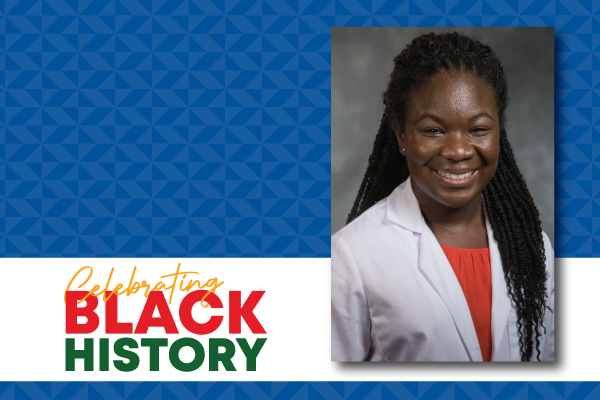
Duke Department of Medicine celebrates Black History Month with its Health Equity Series, which recognizes a few of our faculty, trainees and staff who are dedicated to improving health outcomes in the Black community.
First-year hematology/oncology fellow Allison Taylor, MD, is a first-generation Ghanaian-American who grew up in Accra, Ghana, where she became interested in hematologic malignancies after a family member died from non-Hodgkin’s lymphoma at the age of 25.
Dr. Taylor also noticed, growing up, challenges related to access to health care even when it came to common conditions. To her surprise, when she moved to the United States for college and medical school at Georgetown University, she recognized that the inequities in health care, were not unique to Ghana.
“Once in medical school, I merged my interests in hematologic malignancies with my passion for health equity and became involved in health services and outcomes research in patients with hematologic malignancies,” she said.
As a medical student, then a resident and now a fellow at Duke, Dr. Taylor’s work has focused on exploring the factors that influence clinical outcomes in patients with hematologic malignancies, particularly among those from under-represented backgrounds.
As a medical student she led a project using the National Cancer Database, that focused on the impact of facility characteristics on time to treatment, overall survival, and the receipt of different treatments in patients with acute myeloid leukemia. In Black and Hispanic patients, there was a lower likelihood of receiving chemotherapy and allogeneic transplant, and worse overall survival.
Given the trend in worse outcomes she had seen in her prior work as a medical student, during her Duke residency she shifted gears to qualitive research. With funding from the Duke Faculty Resident Research Grant and the American Society of Hematology Minority Resident Award Program, she recruited and interviewed Black patients with newly-diagnosed acute myeloid leukemia to better understand the factors they perceived to influence their care. Recurrent themes shared in these interviews included factors, both positive and negative, that impacted the treatment experience, and suggestions to improve it.
Shifting gears to cellular therapies, with the discrepancies in access to and outcomes after bone marrow transplants, she plans to focus on understanding the impact of socio-economic and demographic factors on decision-making and clinical outcomes in the peri and post-transplant period, in her research years of fellowship. Additionally, she will be a National Clinician Scholar here at Duke and will receive rigorous training in health disparities, community based and, health services research, as well as in health policy and implementation science.
Dr. Taylor’s goal is to continue to elucidate factors along the continuum from diagnosis, treatment, and at the end of life that lead to differential and often worse outcomes in patients with hematologic malignancies from under-represented groups. Although not an exhaustive list, these factors, she pointed out, can be categorized as distal (structural racism), intermediate (health care access, clinical and molecular characteristics), and proximal (treatment patterns and complications).
“While it is crucial to identify these factors, it is only the starting point,” she said. In a 2022 retrospective study by Ahmed et al., referenced by Dr Taylor, the authors noted that “among the patients with myeloma, all of whom received CAR T cell therapy on a clinical trial, only 1% were African American and 5.4% were Hispanic”.1
“With the rapid transformation of the treatment landscape, and the increase in available treatment options for patients with hematologic diseases, my work will focus on identifying issues related to access for patients from under-represented backgrounds and developing mechanisms to address these challenges with a goal of making care more equitable” she said.
By using mixed method research methodology, and working with different stakeholders including patients, community leaders, clinicians, and policymakers, Dr. Taylor believes she will have a unique and multifaceted approach.
1. Ahmed N, Shahzad M, Shippey E, et al: Socioeconomic and Racial Disparity in Chimeric Antigen Receptor T Cell Therapy Access. Transplant Cell Ther 28:358-364, 2022